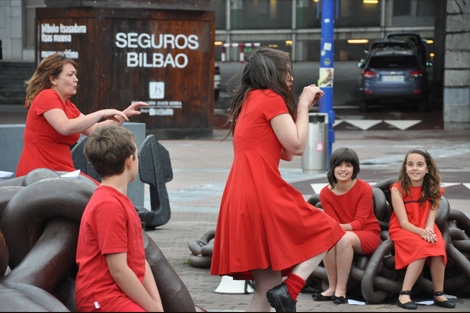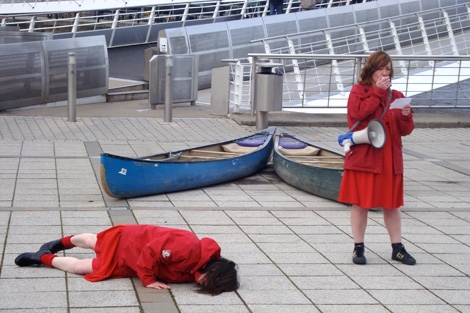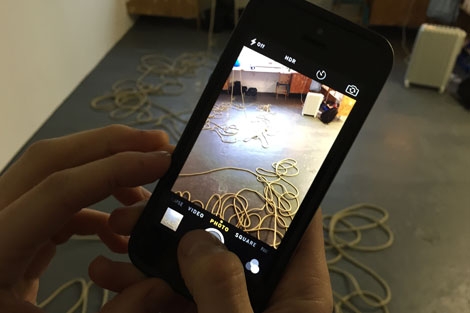As part of my current performance work I am engaged with making a series of duets. Each duet is designed collaboratively between the two duet partners, me and one other person. The duet partners determine the length of work time, the style of the work, the starting place, and the specific making process undertaken.
One of the duets, Seven Falls, has a method that canʼt fail. It is site-specific and must be performed next to a large body of water, a major river, lake or sea. In each location it is performed it is re-made with a few foundation elements common to each version. The method is swift and immersive.
My partner for this duet, Teresa Brayshaw, has a full-time job and a 11-year-old son. If she is to be able to make this work we have to do it fast–she doesnʼt have much time. Our working methods have been designed to allow for her tight schedule. She and I arrive at a site having met a few times for meetings in the month or so leading up to the performance date. Then once on site we usually have 3 to 4 days to re-make the work in response to the site and take care of logistics. The swift turn around time means thereʼs no time for arguing, it means that everything we do during those 3 or 4 days is about getting ready for the piece. Not failing means being flexible, open to change, to uncertainty and being fearless about the possibility of getting it wrong. And if we want the process to be enjoyable it means we have to allow leisure activities to invade these work-heavy days and food and sleep. We stay together, eat together, walk around the environs together, and treat everything as possible material for the work. When our plans are scuttled for logistical reasons we change our plans, treating it as an opportunity to improve the piece. We agree to less than readiness–we are always ready.

Seven Falls, ACT festival, Bilbao
ls that young would be able to deliver the translations, reading off the handwritten cards prepared for them. At our last performance, in Bilbao, we thought we would have 20 young girls from the theatre school making a cameo appearance in red cardigans, we imagined them flying small hand-made red paper kites. Then we were told the school would be finished the week before our show and it would be impossible to get them back to be involved in our show. But, we were told, it was possible that two 12-year-old girls could join us on the day of the performance. The old idea wouldnʼt work with this new configuration. But we had a new one–the girls could deliver the translations into Spanish and Basque of our minimal spoken text. This seemed like a great idea. When photos came the week before our arrival the girls looked more like 16 years old and we asked via email how old they were. There was no answer and unbeknownst to us they changed the girls, assuming, because of our question, that they were the “wrong age”. When we asked about the girls the day before the show we were told that there were new girls now and that they were 8 years old. Now we wondered whether girls that young would be able to deliver the translations, reading off the handwritten cards prepared for them.

Seven Falls, ACT festival, Bilbao
When it was all done, looking back, it was genius to have such young girls reading the translations. They wore red dresses and we wore red dresses and we were amazed how beautiful it was to have them read the translations and then take our bows after weʼd walked into the distance at the end of the piece. In this way, we let the circumstances compose the piece with us and because we had not overdetermined the outcome or solidified our expectations, there was no chance of disappointment and thus no failure.

Seven Falls, ACT festival, Bilbao




